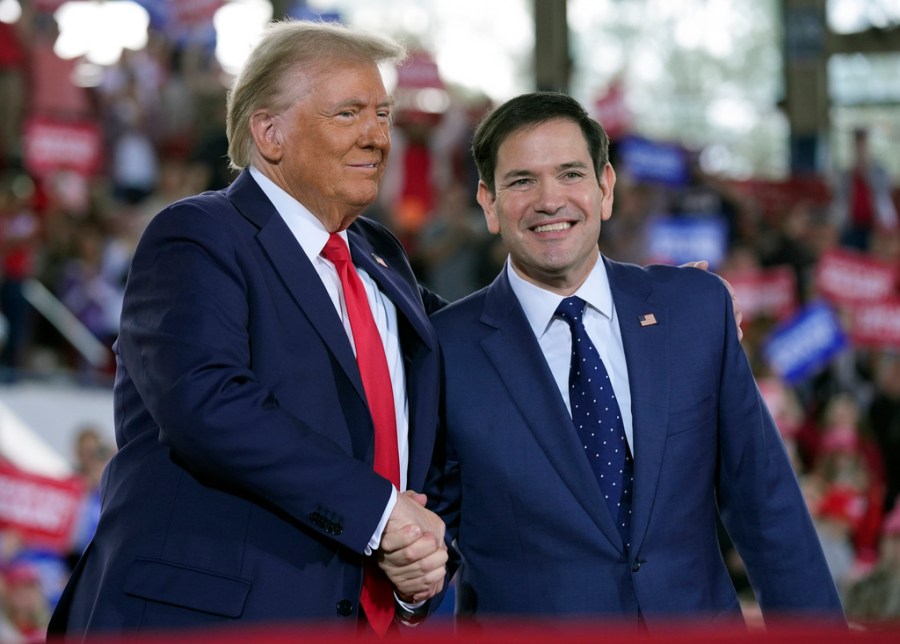[ad_1]

We don’t have to wait till January 2025 — the Trump effect is already underway.
In Venezuela, Nicolas Maduro’s dictatorship is releasing political prisoners. In Nicaragua, Daniel Ortega and his wife passed a radical constitutional reform consolidating power. In Cuba, the regime is amplifying its repression and surveillance over its citizens.
The autocrats are in panic mode.
In July 1980, then-candidate Ronald Reagan said, “We know too well that war comes not when the forces of freedom are strong, but when they are weak. It is then that tyrants are tempted.”
President-elect Donald Trump has announced that he will promote “peace through strength,” a strategy that Reagan implemented as part of his foreign policy vision. And the winds of change have tyrants like Nicolas Maduro and his cronies afraid.
Maduro has congratulated Trump for his decisive victory, praised the civility of U.S. citizens and is begging his archenemy for dialogue. With almost 2,000 political prisoners, Hugo Chavez’s anointed one is now begging for clemency. He is not willing to transfer power in a democratic fashion or form, but the regime wants a fresh start.
Maduro has listened to the same analysts and think-tankers in Washington who predicted Trump’s defeat. Different analysts swear and believe that there will be negotiations, because Trump, according to them, is transactional and likes strong-men like Maduro. That doesn’t seem to be the case.
Venezuela’s Bolivarian Chavista regime wants to repeat the shadow games it played with President Biden. Maduro is a dictator, but he is not stupid. He promised free elections in order to get sanctions lifted, his drug trafficking nephews freed and his financial manager Alex Saab returned from U.S. custody. And of course it was a lie — he rigged the elections anyway.
Now, Venezuela is once again hungry and thirsty for a new deal with the U.S. But times have changed, and there is a new sheriff in town.
Nicaragua’s Daniel Ortega is also in fear mode. His police state’s espionage activities have been redoubled at all levels, inside and outside of his party. He is banishing priests, musicians and anyone who dares to speak his mind.
In 2018, during the civic rebellion in Nicaragua, Foreign Minister Denis Moncada and Ambassador Francisco Campbell came crawling on their hands and knees to Senator Marco Rubio’s (R-Fla.) office, promising dialogue and peace. But Ortega’s regime never kept its word with fair elections.
Cuba, meanwhile, has responded to fear with more repression. The regime with 1,200 political prisoners and 65 years in power knows that bitter days are coming. The Trump administration, and particularly its announced secretary of state designate, knows the regime very well. Rubio is the son of Cuban migrants who experienced firsthand the brutality of the Castro regime.
Cuba is in darkness and under repression. The communist state cannot manage industry or basic services. It has destroyed the nation’s agricultural and fishing sectors. The only excuse of the government for its failures, which no one believes anymore, is that it is the victim of an international embargo that no longer exists.
Rubio and Rep. Michael Waltz (R-Fla.), Trump’s choice for national security adviser, are the two nightmares of the dictatorships of Cuba, Nicaragua and Venezuela. They will put the abuses of these dictatorships on Trump’s agenda. Let us not forget that these regimes are the main root causes of mass migration to the U.S.
And the relationships of Cuba, Nicaragua and Venezuela with Iran, Russia and China represent a grave threat to U.S. national security. The new administration will not support the policy of soft diplomacy, multilateralism or the easing of sanctions. Those days are over.
The first two years are paramount. This is the moment when the administration will have full support from Congress to ensure the end of communist tyrannies. Time is of the essence. A solid foreign policy and a national security focus will be key components to ensure significant changes in the Western Hemisphere.
The opposition leaders of Cuba, Nicaragua and Venezuela have already begun to approach the Trump administration. They are convinced that perhaps this is the last chance to get rid of the dictatorships and restore democracy. The time is right, and so is the leadership.
Let’s get to work.
Arturo McFields is an exiled journalist, former ambassador to the OAS and former member of the Norwegian Peace Corps.
[ad_2]
Source link

